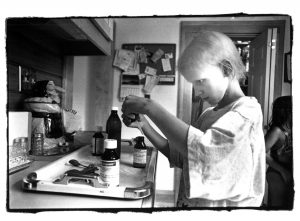I believe that the language we use to describe the human experience shapes our perceptions of that experience as much as we shape the language itself. One of the areas in which I find the use of language quite disturbing is when we talk about cancer.
As an example, Jack Layton’s death from cancer was much talked about in Canadian media. The CBC ran an obituary entitled ‘Jack Layton’s legacy as a fighter’.
When he announced his diagnosis to the media Jack Layton himself said ‘I’m going to fight this cancer now so I can be back to fight for families when Parliament resumes.’
Now granted, my first-person experience with cancer was a long time ago. I had a total of 10 months of aggressive chemotherapy with surgery falling somewhere in the middle. Despite the passage time, one thing I am certain of is that the experience never felt like a battle, a fight, a war, a slugfest…. You get the idea. What I do remember is that when you get a diagnosis of cancer you are immediately swept into this torrent of events over which you have no sense of control, particularly as a child. In my case, the pathologists needed to argue over what type of bone cancer I had which meant there was a brief interlude between diagnosis and onset of treatment. During this time I can remember thinking about how my hair would fall out: one of the ironies of having cancer as a child is that you have no frame of reference for how bad the treatment is really going to be.
I do not remember anyone asking me if I wanted to pursue treatment. As a child, it was not my decision to make. Perhaps my parents were asked but it is one of those decisions around which you have little choice if you hope for your child to survive the illness.
In the case of a battle or fight or war at least one player has a choice about whether or not to pursue conflict. In the case of cancer, it is not like the cancer is making some sort of decision. And as the person it affects you are at the mercy of the disease in terms of the choices you have available.
Also, in the case of conflict I imagine there is an adrenaline rush, the sense that you are taking up some significant challenge or meeting a foe head on. I can tell you, I never felt like that. There was no rush. There was a sense of powerlessness. There were the tears on the days that I had to go to the hospital to be injected up with chemotherapeutics. I remember the nurses coming into my room in full isolation garb with the next bag of chemotherapy to be hooked up to the IV pump. Does that sound like a battle, or a fight, or a war, to anyone?
 © Cathie Coward
© Cathie Coward
I think one of the major repercussions of the way we talk about cancer being a fight is that it implies that there are winners and losers. It suggests that on some level, if you die from cancer somehow the cancer has ‘won’ and you have ‘lost’ the battle. It ignores the fact that when you die the cancer also dies. It also implies that those who die of cancer do not fight as hard or as bravely or as fearlessly as those who survive.
If the experience of having cancer is to be viewed as a battle then the person with it is merely the landscape – that’s the best analogy that I have been able to come up with. On one side you’ve got the doctors, and their arsenal of drugs and treatments and symptom relievers and other modalities, while on the other side is the cancer. And the person with the disease is the landscape on which the battle goes down. The best you can hope for is that the landscape comes out the other side reasonably unscathed. And that after time to heal and rest it starts to look like what it used to. Regardless, the remnants of the battle remain and in many instances the repercussions of the fight that was waged become part of the landscape. And then there are the unfortunate instances where the landscape never recovers. But really the landscape has very little to say in the outcome and can only hope to see the other side of the fight.
